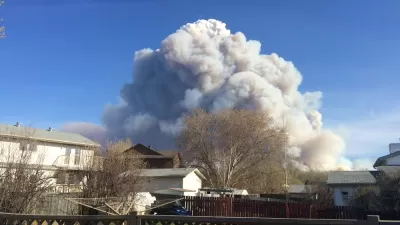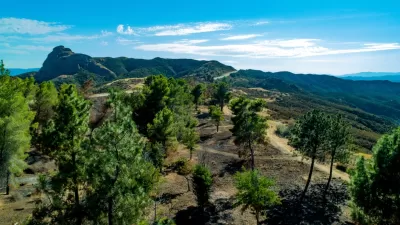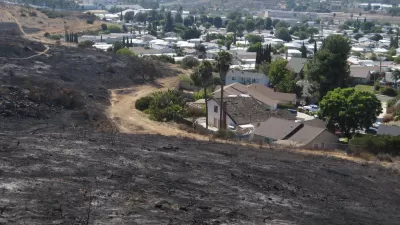In Colorado and the West, the most desirable real estate is also the most likely to burn, writes Michael Kodas.
"It's no surprise that people like to live near forests and mountains," writes Kodas, "but that's precisely where wildfires occur. And because those new residents naturally want to keep their homes safe, they demand that small, otherwise beneficial fires be put out if those blazes threaten their property, which causes forests to become unnaturally thick with unhealthy trees just waiting for a spark. And sparks are exactly what humans often provide."
"It's a vicious cycle: more building in the wildland urban interface [WUI], more property at risk, more firefighting, more fire-prone forests (and in the age of climate change, more hot, dry weather). All of which helps explain why, across the West over the last 20 years, fighting fires has gone from taking up 14 percent of the U.S. Forest Service's budget to almost half of it."
"'Everybody knows that firefighting costs are going up, and everybody knows the WUI has a lot to do with it,' says Ray Rasker, director of Headwaters Economics, an independent research group in Bozeman, Montana. According to the group's data, the U.S. government is spending as much as $3 billion a year to fight wildfires -- twice what was being spent 10 years ago. 'About a third of those costs are for defending homes,' Rasker adds."
Thanks to OnEarth
FULL STORY: Life on the Edge (of Wildfire)

Planetizen Federal Action Tracker
A weekly monitor of how Trump’s orders and actions are impacting planners and planning in America.

Restaurant Patios Were a Pandemic Win — Why Were They so Hard to Keep?
Social distancing requirements and changes in travel patterns prompted cities to pilot new uses for street and sidewalk space. Then it got complicated.

Maui's Vacation Rental Debate Turns Ugly
Verbal attacks, misinformation campaigns and fistfights plague a high-stakes debate to convert thousands of vacation rentals into long-term housing.

In California Battle of Housing vs. Environment, Housing Just Won
A new state law significantly limits the power of CEQA, an environmental review law that served as a powerful tool for blocking new development.

Boulder Eliminates Parking Minimums Citywide
Officials estimate the cost of building a single underground parking space at up to $100,000.

Orange County, Florida Adopts Largest US “Sprawl Repair” Code
The ‘Orange Code’ seeks to rectify decades of sprawl-inducing, car-oriented development.
Urban Design for Planners 1: Software Tools
This six-course series explores essential urban design concepts using open source software and equips planners with the tools they need to participate fully in the urban design process.
Planning for Universal Design
Learn the tools for implementing Universal Design in planning regulations.
Heyer Gruel & Associates PA
JM Goldson LLC
Custer County Colorado
City of Camden Redevelopment Agency
City of Astoria
Transportation Research & Education Center (TREC) at Portland State University
Camden Redevelopment Agency
City of Claremont
Municipality of Princeton (NJ)





























